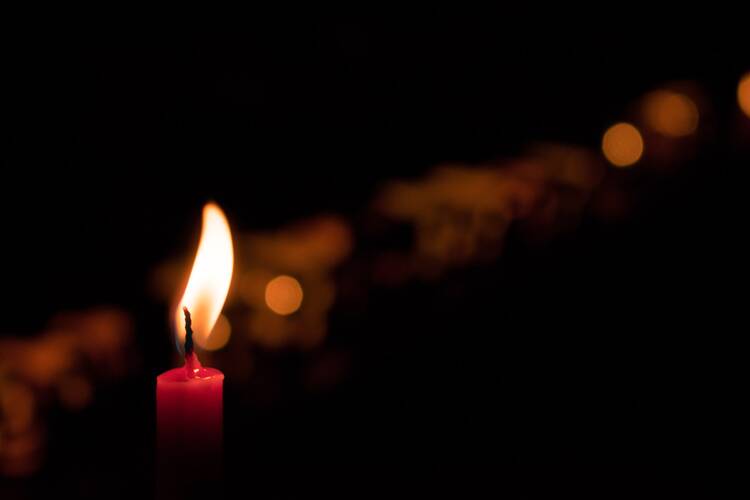A Reflection for Saturday of the Second Week of Advent
Find today’s readings here.
“In those days,
like a fire, there appeared the prophet, Elijah
whose words were as a flaming furnace.” (Sir 48:1-4, 9-11)
Waiting, darkness, hope. The Advent “buzz words” have started to appear across homilies and Scripture reflections in the pages of America, but today’s readings introduce another, perhaps unlikely word into the lineup: fire. The first reading from the Book of Sirach is replete with images of “fire” and “zeal” and “light.” We are introduced to the prophet Elijah, “whose words were as a flaming furnace.” At the time, many Jews were worshiping the false god Ba’al and Elijah came to set them on the path of holiness before the coming of the Messiah. He was so impassioned by what he was proclaiming that he was “aloft in a whirlwind of fire.” A fire from within Elijah burned for the love of God and illuminated his work among the Jews.
Then, in the Gospel, Jesus says that John the Baptist is the new Elijah, having been tasked with the same evangelizing mission. John was preparing the people for Christ’s coming: “I have come to set the world on fire and how I wish it were already kindled” (Lk 12:49). John, through his preaching and prophesying, put logs on the fire, collecting kindling and preparing for the world to become ablaze with God’s love. But no one listened to John the Baptist and they did “whatever they pleased,” just as people ignored, persecuted and outcasted Elijahfor prophesying.
In the Gospel, the disciples ask a very important question: “Why do the scribes say that Elijah must come first?” Essentially, they are asking: Why do we have to wait for the coming of God? Can’t God just show up? Why must Elijah (and in this case, John the Baptist) come first?
We cannot welcome the fire of Christ into our lives if we are afraid of the flames.
Jesus reminds them Elijah/John the Baptist must “restore all things”; he must come and light the way to God with the fire of his love. We cannot welcome the fire of Christ into our lives if we are afraid of the flames.
It can be easy to resist that flame, the love of God, illuminating our spiritual path and showing us goodness that we may have never uncovered. It can be easier to stay hidden in the darkness, away from the flame, with no chance of being burned. But during Advent, we are called closer to the flame, out of darkness with an openness to God’s love active in our lives. As we wait in joyful hope, we ask the same question the disciples asked on the road to Emmaus: “Were not our hearts burning [within us] while he spoke to us on the way?” (Lk. 24:32). We listen for God calling us near to him so that our hearts may also catch flame.
With each passing Sunday, we light the Advent candles, looking to the light of the flame illuminating the wreath as a symbol of all-encompassing love. Elijah must come first. The flame must burn so that we may see the light of the world.








